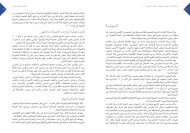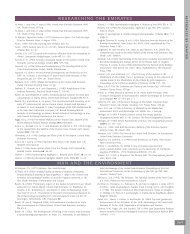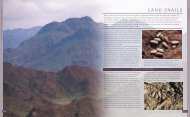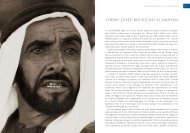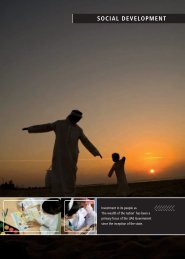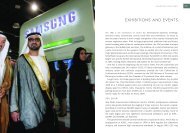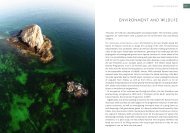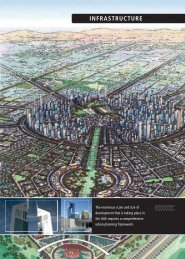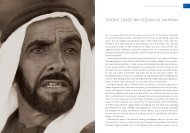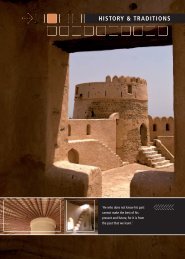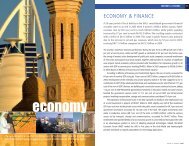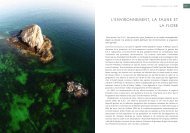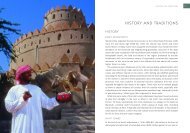Create successful ePaper yourself
Turn your PDF publications into a flip-book with our unique Google optimized e-Paper software.
166UNITED ARAB EMIRATES YEARBOOK 2006<strong>ECONOMIC</strong> <strong>DEVELOPMENT</strong>167A healthy export market has been developed for many items that are grownin the country. To give an idea of the scale of production, emphasising just howfar this sector has travelled since the 1960s when Sheikh Zayed took spade tohand in an effort to galvanise his people into rescuing ancient falaj systemsaround Al Ain, we can look at recent figures from the Al Ain Department ofAgriculture and Livestock (AADAL), now part of the Department of Municipalitiesand Agriculture. They recorded 12,000 farms in Al Ain, 1943 green houses and29,990 operating wells. These farms employed 2608 workers including 623nationals, 529 Arabs and 1456 other nationalities. They exported 63,390 tonnesof vegetables worth Dh126,893 in 2004 following an increase in the crop areathrough drip irrigation to 450.72 hectares. AADAL also recorded exports of 843.77tonnes of rodos fodder from its five projects – Al Dhahra, Al Kerayyah, Al Arad,Al Oja and Wahat Al Sahraa – to various GCC destinations. Meanwhile, the Al AinDepartment of Municipalities and Agriculture (ADMA) distributed cheques worthDh262.53 million to local date producers for the 32,281 tonnes of dates that itprocured during 2004. AADAL also established 16 veterinary clinics, in additionto mobile clinics in remote areas, and opened an abattoir in Al Khazna area.New methods of agriculture are constantly under review in the Emirates. The <strong>UAE</strong>is especially interested in new agricultural techniques that can boost yields withoutadversely affecting the environment and human health. Organic agriculture, asubject of growing interest worldwide, is being encouraged. In line with efforts tobolster availability of pesticide-free crops, the Ministry of Agriculture and Fisherieshas encouraged the use of organic fertilisers and over 32,000 tonnes has beendistributed to local farmers in the last three years. Also, the use of more than 80varieties of pesticides has been banned and biocontrol of pests such as the palmweevil is being developed.Education in agriculture has reached a high level in the <strong>UAE</strong>. The Universityof Sharjah recently launched a College of Agriculture, Food and EnvironmentSciences in conjunction with the University of Arizona, USA. The final decision togo ahead with the college was made after months of research to determine whetherthere would be a strong market for graduates wishing to study plant, animal andfood production under <strong>UAE</strong> conditions. The University of Arizona was selectedbecause of its well-earned reputation in the States, the distinction it enjoys inthe field of desert farming and the similarities in climatic conditions betweenArizona and the <strong>UAE</strong>. The College of Agriculture, Foods and Environment willaward BSc degrees across three areas including botany, zoology and agriculturalprojects management. Bio-technology will be a fundamental component of thestudy, which will also focus on more practical skills. Students will thus gaintheoretical and practical skills needed to enable them to participate in productionand development plans in the country.Formal research into agricultural matters is carried out by a number of bodies,both national and international. The EAD (formerly known as ERWDA) and theInternational Centre for Biosaline Agriculture (ICBA) recently agreed to carry outa comprehensive soil survey of Abu Dhabi Emirate. A high priority is beinggiven to the development of a Soil Master Plan, delineating arable lands as wellidentifying other substrates. The ultimate goal of the soil survey is to ensure thatland-use in the Emirate of Abu Dhabi is sustainable. Identification of thedifferent land uses will be jointly determined by a technical committee whichincludes the members from the Ministry of Agriculture and Fisheries, theMunicipalities and Agriculture Department, <strong>UAE</strong> University, the Planning andEconomic Department, and ADNOC. The project will be completed in twophases. In the first phase, soils will be surveyed at the emirate level at a scaleof 1:100,000 using soil survey norms and standards of the United StatesDepartment of Agriculture-Natural Resources Conservation Service to generate,soil, thematic, suitability, salinity, and current land-use maps. From the resultsof this phase, areas with the highest potential for irrigated agriculture expansionin the emirate will be identified. In phase two, these areas will be surveyed atscale of 1:25,000. A Soil Information System will be designed for the storage,processing, retrieval and management of soil-related information. The soilsurvey information will be used by various groups of users, for example, theagricultural farming community, land-use planners, officials, decision makers,engineers, and environmental impact assessors, to select sites for specific uses.Conservationists and specialists in recreation, wildlife management, wastedisposal, and pollution control will also use the soil information to help themunderstand, protect, and enhance the environment.Over the course of the last year, however, increasing attention has also been paidto the impact of water extraction for irrigation on the subterranean aquifers, aswell as to the economic sustainability of the whole afforestation and agricultureprogramme. Several hundred water wells in Abu Dhabi were shut-in during theyear, with water supplies being replaced from desalinated water, while the viabilityof large scale fodder production is also being re-assessed. The objective is to ensurethat while the planting programme continues, it is done only where it can bejustified on economic and environmental grounds.In April 2005 the late Sheikh Zayed bin Sultan Al Nahyan was honoured by theUnited Nations as a ‘Champion of the Earth’ for his commitment to the protectionand conservation of the environment and endangered wildlife. It was an accoladethat was deeply appreciated by Sheikh Zayed’s immediate family and by the <strong>UAE</strong>Government and people, for it encapsulated one of the guiding mission’s of SheikhZayed’s life and celebrated his success in achieving many difficult goals in thefields of agriculture and environment.



